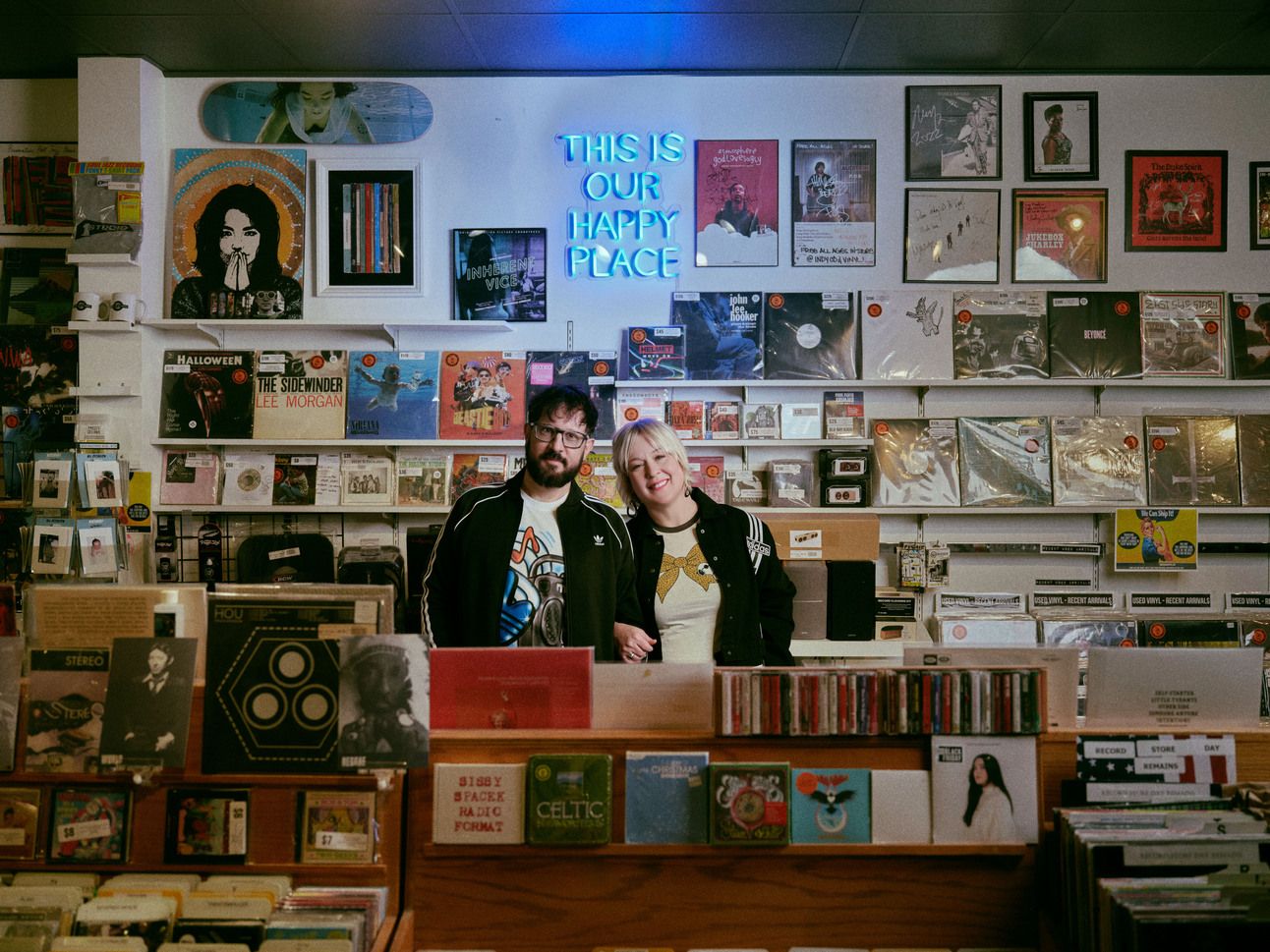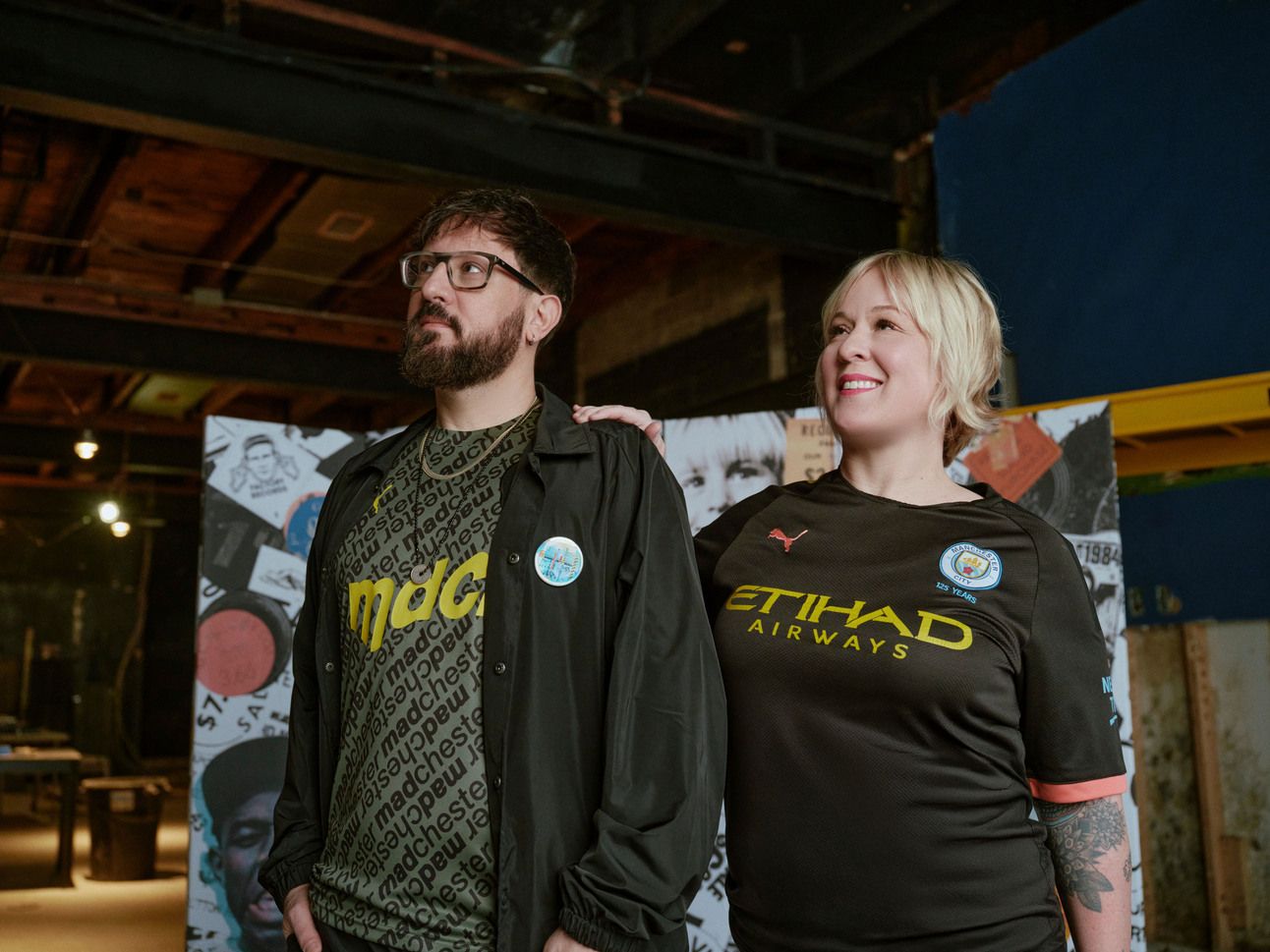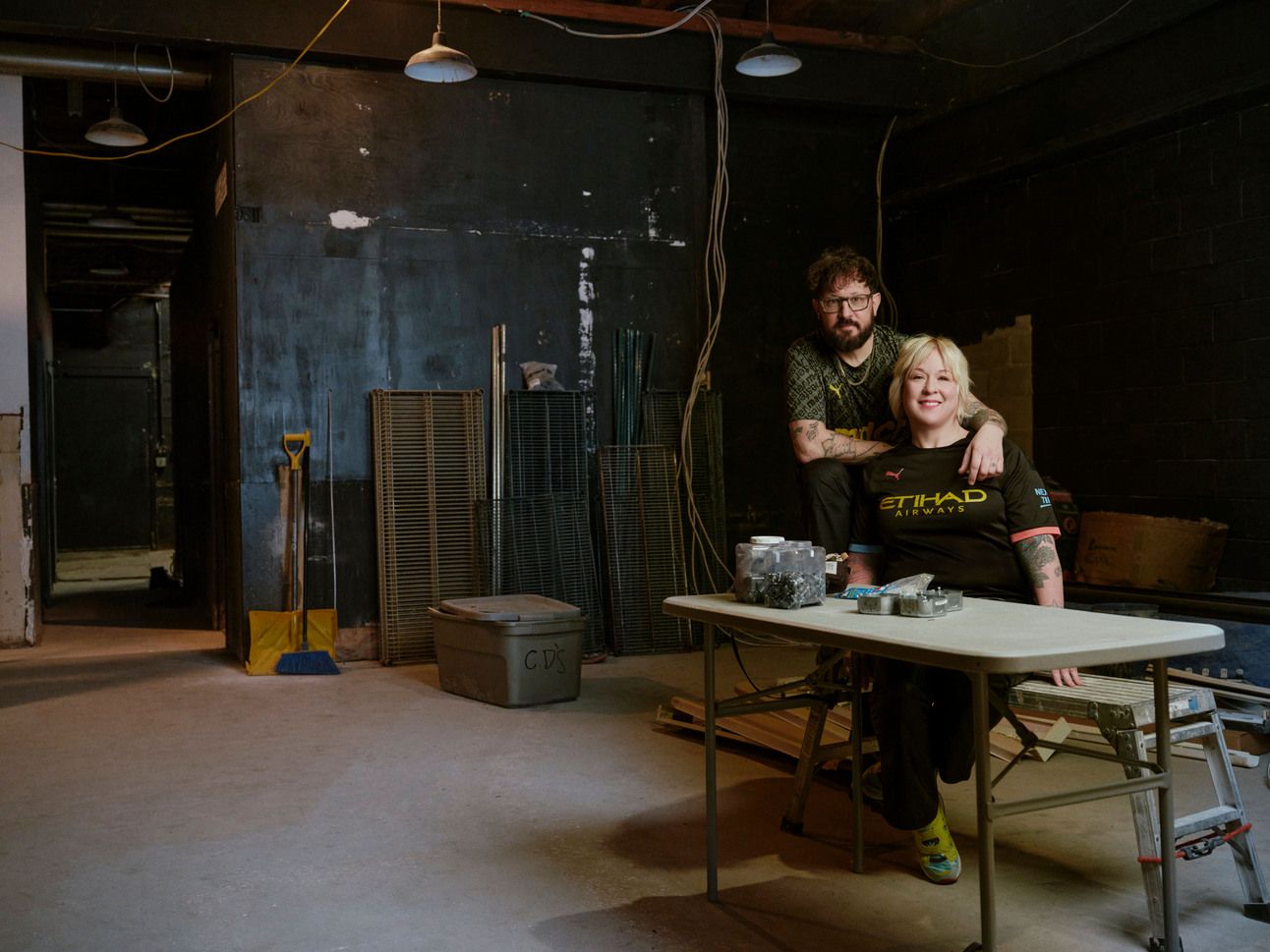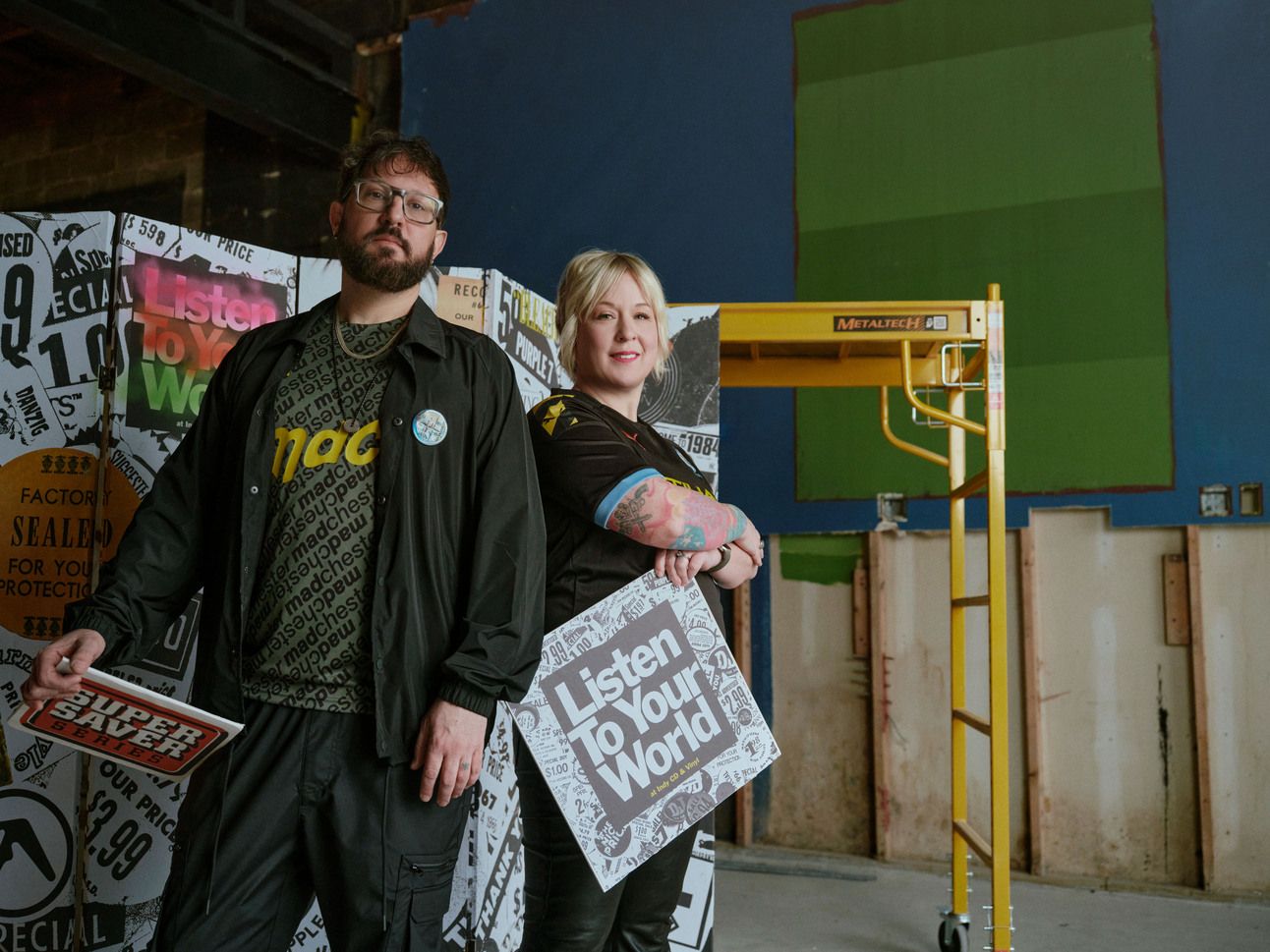
The Couple Spinning Vinyl, Culture, and Community
If you’ve been around Indy’s music scene, you’ve probably crossed paths with Andy and Annie Skinner—or at least felt the ripple effect of their work. They’re the duo behind Indy CD & Vinyl, the city’s largest record store and a Broad Ripple institution. The shop is the center of gravity for a whole orbit of creative work: DJ gigs, the nightlife events Real Talk and Spellbound, a vinyl label, music marketing through A-Squared, zines, nonprofit work, and now, the buildout of a new all-ages venue next door.
The Skinners aren’t just preserving music culture in Indianapolis—they’re actively shaping it. And they’ve been doing that work for decades, powered by equal parts grit, curiosity, and deep belief in the role of art in community. I sat down with them to talk about what keeps them going, what Indy’s music ecosystem still needs, and how they’ve sustained both a creative partnership and a marriage through it all.
Per usual, we’ve edited the transcript for clarity and brevity.

Credits: Photography by Jay Goldz, Style by Katie Marple, Hair & Makeup by Jessica Winchell, Words by Polina Osherov, Cover Design by Lindsay Hadley
Polina Osherov: You’ve managed to make a business in music work—and for a long time. What do you think are the core ingredients to surviving and thriving in such a tough, niche industry?
Annie: Passion, number one. If we weren’t passionate about music and about making Indy a better place to live, I don’t think we could keep doing this. That combination is our north star—it’s the fuel that keeps us moving.
Andy: And Indianapolis has its own magic. It’s a very big small town, which means everyone in the arts and music world eventually crosses paths. Relationships matter here. So you’ve got to be diplomatic, know how to work with people, not burn bridges. You also have to be nimble. We’ve made it through Covid, and then two years of street closures right outside the shop. That kind of stuff will crush you if you’re not adaptable.
Annie: We say yes a lot. We take opportunities. It’s not that we have some big master plan—it’s just that we stay open and follow what feels right.
Andy: Yeah, we’ve never stayed in our lane. We’ve kind of wandered across multiple lanes, actually, and that’s worked in our favor.

PO: You guys are doing a lot right now—Indy CD & Vinyl, A-Squared, DJ nights, zines, the new venue, the label. How do you think about diversifying income streams while staying focused and not burning out?
Annie: Yeah, that’s the thing—it’s mostly passion projects. Spellbound pays for itself. The label supports itself just enough to keep going. But we’re not driven by profit. We’re driven by the work. If something makes enough money to keep doing the thing, that’s a win.
Andy: Most of what we make goes right back in. We reinvest in the next thing. We do what we love and try to keep it sustainable. Sharks gotta keep moving. That’s us. We don’t drop our old goals when we hit them—we just layer new ones on top. It’s not about avoiding burnout, really. It’s about staying connected to the passion that got us into this in the first place.
PO: What did you have to unlearn from the early days to get to where you are now?
Andy: For me, it was learning when not to fight. There’s this thing we talk about called “spendable social capital.” You earn it over time, but if you’re not careful, you can burn through it by going to battle over every little thing.
Annie: And if he’s fighting a battle, then I’m fighting that battle too. So we’re both in it, and that takes a toll. I’m an empath to a fault, and I used to take everything really personally. That’s something I’ve had to unlearn—or at least manage. Because in this business, if you internalize every critique or conflict, you’ll fall apart.
Andy: There are people who make a living stirring the pot. That’s not who we are. I’d rather use my energy to build something than to argue online.
Annie: Same. Positivity matters. Especially now.
PO: Record Store Day was a turning point for the vinyl resurgence. What did being part of that movement teach you about collaboration in the music industry?
Andy: Record Store Day fits us perfectly. We’re professional plate-spinners, and that event needs people who can juggle marketing, live music, community outreach, and just general chaos. We’ve built out what we call our “party in a box.” We can throw a full-blown block party with very little notice.
Annie: For us, vinyl never really went away—we’ve been collectors forever. But what Record Store Day did was make it accessible and exciting to new generations of collectors. It’s not just for one kind of person anymore. It’s for everyone.
Andy: I love that. People collect for all kinds of reasons. Some don’t even play the records—they just want to own them. I used to be offended by that, but now I get it. It’s about the object, the ritual, the art.
Annie: And that ritual is important. You don’t invite friends over to scroll your MP3s. But you do gather around a record player. You talk. You connect. I watched our kid, as a toddler, mimic the way I open records—turning them over, smelling the ink on the jacket, holding the sleeve a certain way. He learned just by watching. That told me how deep this really runs.

PO: Indy has no shortage of music lovers, but the music industry still feels fractured and under-supported. What’s missing—and what could help bring it together?
Andy: I don’t totally agree that it’s under-supported. If you look at where we were 20 years ago versus now, it’s night and day. You can go out any night and hear hip hop, honky tonk, experimental noise, dance music—whatever you’re into, it’s probably happening. That didn’t exist back then.
What still needs work is support for all-ages shows. That’s been the missing piece for decades. Back when I was an all-ages promoter, I could only make money on ticket sales. Now, most venues need alcohol sales to survive. That’s why your favorite band might play Chicago and Cincinnati but skip Indy—there was no venue here that could give them what they needed without booze sales.
Those blue laws are slowly loosening, and in some cases, Live Nation helped force that shift. And honestly? I’m not mad at them. Everyone likes to complain that they get all the big tours, but they built the infrastructure to support those tours. They own the venues, the catering companies, the whole machine. They figured it out. And they brought tours here that used to skip us completely. That’s a win.
You let Live Nation be Live Nation, and that opens space for other promoters—like MOKB, HI-FI, and Black Circle—to do their thing in the second tier. There’s a place for everyone. You just have to know what lane you’re in and not try to be something you’re not.
The challenge now is about visibility. Even with all our digital tools, people still don’t know what’s going on in their own city. Getting the word out is still one of the hardest parts.
Annie: And we need people to show up. That’s the biggest thing. We’ll DJ a song, and the room goes wild. Then we book the actual band to come to town, and nobody shows. We’ve started booking bands during our DJ nights just so there’s a built-in audience. But it’s still frustrating.
Music is community. It gives people a place to belong. That’s especially true for folks who feel like they don’t fit anywhere else—queer kids, introverts, weirdos of all kinds. Music makes space for them. That’s why we do what we do. Because it’s not just about the music—it’s about who you get to be when the music’s playing.

PO: You’ve both been involved with Girls Rock, Musical Family Tree, and other nonprofits. What role do those kinds of community organizations play in sustaining the scene?
Annie: They’re crucial. Not everyone wants to engage with the music scene through bars and nightlife. Nonprofits give people other ways in. Girls Rock, in particular, changes lives. I saw it happen every year—campers, counselors, even parents. It’s powerful.
Andy: And those nonprofits are often where the all-ages work is happening. They’re the ones making sure young people can access music—not just as fans but as future artists, organizers, and leaders. That’s how the ecosystem regenerates.
PO: You’re not just business partners—you’re life partners. What’s the secret to keeping both sides of the relationship thriving?
Annie: It’s like wrestling. We tag each other in and out. Knowing when to step back, when to step up, how to communicate—we’ve gotten better at that over the years.
Andy: It helps that we share a lot of the same skill sets. She’s the ideas person, and I glue things together. But we can also step into each other’s roles. There’s a lot of mutual respect. That’s what makes it work.
Annie: And if we’re not creatively fulfilled, everything suffers—including our relationship. Doing is how we stay grounded.

PO: If someone handed you a million dollars and said, use this to make Indiana a better place for music, what would you do?
Annie: We’d finish the space next door. That’s what we’re already trying to do. Create an all-ages venue, a place for baby bands, for artists who aren’t ready for the Vogue but need somewhere to grow. That’s what Indy’s missing.
Andy: And we’d build an “ATM” for young artists. A small fund they can draw from to record, press physical media, and promote their music. Just enough to get over that first hump. There are plenty of recording studios in town, but making the actual product is expensive. We’d help them bridge that gap.
Annie: It’s not just about helping them perform—it’s about helping them become.
PO: You’ve had a hand in shaping Indy’s music scene for decades. What are you most proud of?
Annie: That I said yes to moving here in the first place. I moved here from Utah, knowing no one. I planned to go back. But I stayed, and I’m so glad I did. I’ve met incredible people and done things I never thought possible. I’m proud of the life we’ve built here and the people we’ve built it with.
Andy: Kurt Vonnegut said, wherever you go, there’s always a Hoosier doing something important. I’m proud to be one of those Hoosiers. I’m proud of the people we’ve worked with—people who are now DJs, promoters, and artists in their own right. We didn’t hoard knowledge. We shared it. We said, if you want to do it, go do it. That mindset—that rising tide energy—has made all the difference.
Stay Connected

PATTERN is a 501(c)(3) nonprofit. Your donations make our work possible.
Subscribe to our Print Magazine and support creatives across the state.
Love our work? Hire us! We're passionate about storytelling and design. Email [email protected] to discuss your project and explore how we can bring your vision to life.
This story was made possible thanks to the generous support of our friends at Life in Indy.

